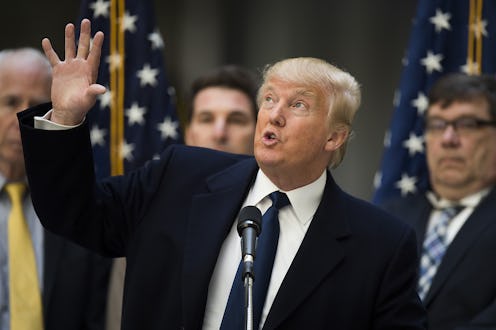News
So, Who's The GOP Frontrunner Now?
Another day of voting in the books! On Tuesday ― dubbed "Western Tuesday" by a number of news outlets ― three more states went out to vote, with caucuses in Idaho and Utah, and primaries in Arizona. And yet, now that it's all said and done, the state of the Republican presidential race still seems shaky — not quite settled and not quite safe. So who is the Republican frontrunner after Western Tuesday?
Well, let's look at the delegates! Although three states held contests on Tuesday, only two of them involved the Republicans ― Idaho was only holding its Democratic caucuses, having already wrapped up the GOP's side of things on March 8. In the Utah caucuses, much like the polls suggested heading in, Donald Trump took a drubbing from Texas Sen. Ted Cruz, losing by a margin of 69 percent to 14 percent (he actually finished third, behind even Ohio Gov. John Kasich). Having passed the 50-percent threshold, Cruz claimed all of the state's 40 delegates.
In Arizona, however, Trump won big. In that closed primary, Trump needed to win a mere plurality of the vote to seize the state's entire trove of 58 delegates. And that's how it played out ― he bested Cruz by 47 percent to 25 percent, with Kasich bringing up the rear at 10 percent. In other words, Cruz took 40 delegates from Utah, and Trump took 58 from Arizona, meaning Trump's lead has widened by 18 delegates. He's now out ahead of Cruz by 275 total delegates.
This is all a long way of saying that yeah, Trump is still the Republican frontrunner. He's been occupying that position for months, and it doesn't look like it's going to stop anytime soon ― he's proven that his appeal can stretch across very ideologically diverse states, and he's still the only GOP candidate with a clear, credible path toward winning the nomination outright.
It's crucial to remember when following presidential primaries that winning states doesn't matter; winning delegates does. A Republican candidate needs at least 1,237 to lock down the nomination on the first ballot of the convention, which is a very important threshold. If voting goes past a first ballot, the delegates become unbound, and may support whomever they please, even if they weren't a primary candidate at all.
And while there's still the nagging possibility that Trump could be upset in a contested convention if Kasich and Cruz cobble together enough delegates to deny him, their hopes of getting it done the normal way are virtually nil. Kasich sits at just 143 delegates with 848 remaining ― meaning he's mathematically eliminated from the chase for 1,237 ― and hasn't won a single state besides Ohio. The fact that he still won't drop out makes it obvious enough that he's banking on some convention chaos to make his move.
Cruz has racked up a number of wins, especially in caucus states, but while he's still technically able get to 1,237, but it's effectively over for him. He sits at just 463 delegates with 848 remaining, meaning he'd have to win all but 74 of the remaining delegates on the schedule. Trump, by contrast, needs just 499 more, in addition to the obvious momentum he holds over the rest of the field.
Simply put, Donald J. Trump remains the Republican frontrunner, just as he's been for a while now. The only question left on the table is whether he can take the next step to "presumptive nominee" ― there's another massive contest coming up in Wisconsin on April 5 that'll be worth paying attention to.
